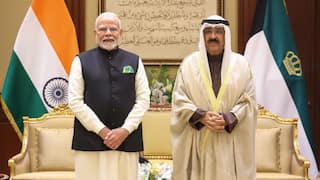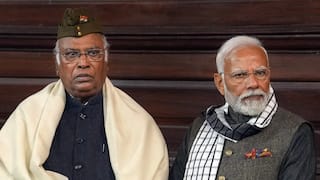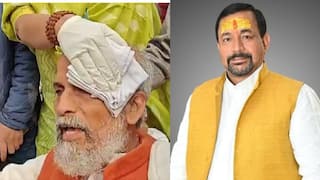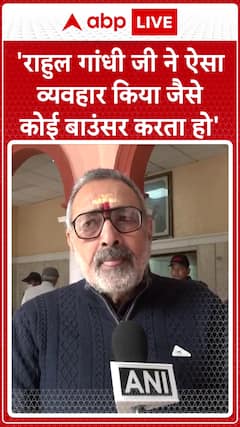Arzi Hukumat, The Provisional Government In Mumbai That Liberated Junagadh From Its Nawab Who Fled To Pakistan
In 1947, the Arzi Hukumat was established in Mumbai to oppose the accession of Junagadh to Pakistan. Within five days, the Nawab fled, and by November, Junagadh was integrated into the Indian Union.

On September 25, 1947, as India was adjusting to its newfound independence, a quiet but significant moment in the nation's political history unfolded in Mumbai. In the heart of the bustling city, leaders gathered at Madhavbagh to lay the foundation of the 'Arzi Hukumat' — a provisional government aimed at liberating Junagadh from the hands of its Nawab, who had controversially decided to accede to Pakistan. This movement, fuelled by patriotism and a deep-rooted commitment to justice, became an iconic example of political resilience and grassroots leadership.
Junagadh 1947: A Controversial Decision
Junagadh, a princely state situated in Gujarat's Kathiawar region, held strategic and symbolic importance. Though its population was predominantly Hindu, the state was ruled by a Muslim Nawab, Mahabat Khan III. Following India's independence in August 1947, princely states were given the choice to accede to either India or Pakistan. Most princely states opted for India, particularly those surrounded by Indian territory. However, the Nawab of Junagadh made a startling decision — he chose to accede to Pakistan, a decision that bewildered many given Junagadh's geographic location and demography.
The news of the Nawab's accession to Pakistan spread unrest among Junagadh’s predominantly Hindu population. The local people, led by several leaders, were not in favour of this decision. The Nawab's administration, primarily managed by his Diwan, Shah Nawaz Bhutto (the father of Pakistan's future Prime Minister, Zulfikar Ali Bhutto), tried to implement the decision despite growing unrest. Bhutto's heavy-handed approach — enlisting mercenaries from Sindh and cracking down on protests — only exacerbated the situation.
The Birth Of The Arzi Hukumat
As tensions escalated in Junagadh, a parallel effort to resist the Nawab's decision took shape hundreds of miles away in Mumbai. Prominent leaders from Junagadh and the surrounding princely states came together to form the Arzi Hukumat, or provisional government, with one clear aim: to free Junagadh from the Nawab’s rule and align the state with India.
On September 25, 1947, the Arzi Hukumat was officially formed in Mumbai. Shyamlal Gandhi, a nephew of Mahatma Gandhi and editor of Vande Mataram, a nationalist daily, was appointed as its leader. His commitment to the cause and his political experience made him the unanimous choice for this challenging task.
Kanhaiyalal Munshi, another influential leader, played a pivotal role in outlining the blueprint for the movement. The formation of the Arzi Hukumat was not just a symbolic gesture; it was a calculated political move, laying the foundation for what would become a defining moment in Junagadh’s history.
The leadership of the Arzi Hukumat included a group of determined freedom fighters and leaders from the region. Ratubhai Adani from Amreli was appointed the chief of the army, Suragbha Varu as the defence minister, Manilal Doshi as the home minister, and Narendra Nathvani as the law minister. Each of these leaders played a crucial role in galvanising public support and coordinating efforts both within Junagadh and from the safety of Mumbai.
ALSO READ ON ABP LIVE | Junagadh History: How The Last Nawab's Move To Join Pakistan Poorly Backfired In 1947
Mumbai’s Role As The Hub Of Resistance
While the battle for Junagadh’s future played out in the streets of the princely state, Mumbai served as the nerve centre of the resistance movement. The city’s strategic location, away from the immediate pressures of Junagadh’s political turmoil, allowed the leaders of the Arzi Hukumat to plan and execute their strategies in relative safety.
Mumbai was not only a hub for political leaders but also a centre for communication and mobilisation. The Arzi Hukumat’s establishment there allowed it to reach out to leaders across India and secure support from prominent nationalists, including Mahatma Gandhi.
In fact, on the eve of the formation of the provincial government, Mahatma Gandhi remarked during a prayer meeting: “Junagadh should not go to Pakistan”, a statement that underscored the critical importance of the situation.
The formation of the Arzi Hukumat in Mumbai also allowed for coordination with neighbouring princely states like Jetpur, Bilkha, and Manavadar, which supported Junagadh’s alignment with India. The leaders in Mumbai made strategic decisions that enabled them to build alliances and organise the necessary resources to mount a robust opposition to the Nawab’s decision.
ALSO READ ON ABP LIVE | Jam Saheb Of Jamnagar — Big-Hearted Maharaja Who Connected India and Poland During WWII
The Path To Victory
In just five days after its formation, the Arzi Hukumat began seeing victories. It coordinated efforts with leaders on the ground in Junagadh and the surrounding regions, slowly building momentum against the Nawab’s administration. The growing unrest and opposition forced the Nawab to flee to Pakistan, leaving Shah Nawaz Bhutto in charge. But even Bhutto’s attempts to suppress the rebellion with the use of mercenaries and military force could not stop the tide of resistance.
By November 1947, the Indian government, recognising the will of Junagadh’s people and the effective work of the Arzi Hukumat, sent troops into Junagadh. The Nawab’s remaining forces were overpowered, and Junagadh was officially integrated into the Indian Union.
This report first appeared on ABP Asmita, and has been translated from Gujarati.
Trending News
Top Headlines
































